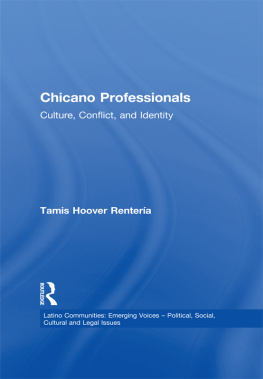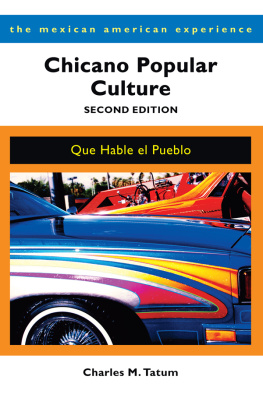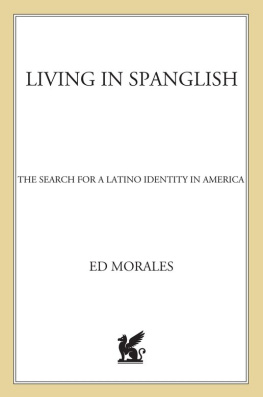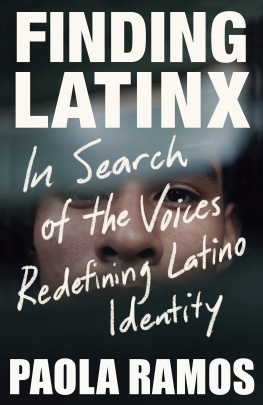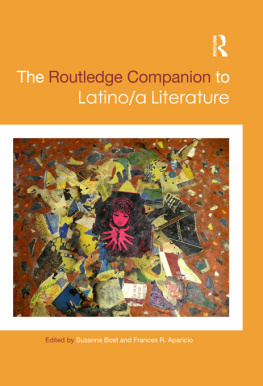LATINO COMMUNITIES
EMERGING VOICES
POLITICAL, SOCIAL, CULTURAL, AND LEGAL ISSUES
edited by
ANTOINETTE SEDILLO LOPEZ
UNIVERSITY OF NEW MEXICO
CHICANO PROFESSIONALS
CULTURE, CONFLICT, AND IDENTITY
TAMIS HOOVER RENTERA
First published by Garland Publishing, Inc.
This edition published 2011 by Routledge:
Routledge Routledge
Taylor & Francis Group Taylor & Francis Group
711 Third Avenue 2 Park Square, Milton Park
New York, NY 10017 Abingdon, Oxon OX14 4RN
Copyright 1998 Tamis Hoover Rentera
All rights reserved
Library of Congress Cataloging-in-Publication Data
Rentera, Tamis Hoover.
Chicano professionals: culture, conflict, and identity/Tamis
Hoover Rentea.
p. cm. (Latino communities)
Includes bibliographical references and index.
ISBN 0-8153-3093-6 (alk. paper)
1. Mexican Americans in the professions. I. Title. II. Series.
HD8038.U5R46 1997
331.7'12'0896872073dc21
97-35336
Contents
A Cultural Interpretive Approach; Cohort Analysis; The
Movement; The Chicano Professional Culture of Los
Angeles: A Preview
I. Mapping the Cultural Territory
1. Generations
The Second Annual CMAC/CMSA Conference;
The Second Annual Summer Associates
Reception; Coming Out Parties: An Emerging
Elite
2. Networks
The Network Experience; From Undergraduate
Clubs to Professional Organizations; Multiple
Network Uses; Family: The Cultural
Construction of the Network Community
3. Identity
What's in a Name? Chicanos, Latinos, Mexican
Americans and Hispanics
An Evening Discussion; The Politics of Naming;
More Cohort Struggles Over Naming; Outside
Influences; Strategies of Ethnic Labeling
II. Race and the Roots of Resistance
Movement Symbolism; Racial Metaphors and
the Movement Cohort Today; Gender in
Professional Chicano Ethnicit
An Explosion of Stories; Success Stories and
Racism; Everyday Stories of Racism; The
Power of the Experienced Racism Story;
Conflict and Confession: Why We Need the
Experienced Racism Story
III. Negotiating a New Class Identity
Status and Class Awareness; Ambivalence;
Choices and Strategies
The Career Track; Choosing A Career;
Professional Training; Volunteering Outside
of Work; Time
IV. The Assimilation Myth
Speaking Spanish; Culture: Arts and History;
Family; Losing or Creating Culture?
V. Postscript
Preface
I began to wrestle with the issues in this book on my first day as an undergraduate at Stanford in September 1972. Eighteen, dressed in a mini-skirt, blonde hair swinging and my arms loaded with suitcases, I walked into the lobby of Casa Zapata, the Chicano Theme House and dormitory, full of naive excitement about my anticipated encounter with the Mexican cultural Other.
The Chicanos at Stanford quickly set meand my WASP assumptionsstraigh. An encounter with the Other, if it is genuine, may begin with giddy attraction, but will inevitably evolve into something more difficult and profound if pursued.
I owe thanks and continued dialogue to all the Chicanos, and the handful of Anglos, with whom I argued and discussed into the wee small hours, in dormitory halls and rooms, those ideas which challenged my perspectives and opened me up to a whole new world view. I feel particularly grateful to Ramon Flores, Jose Padilla, Mickey Baeza, Sylvia (Martina) Puente, Arturo Pacheco, Gayle Turner, Nancy Mayans, and Elena Robles. I don't hold any of these ex-Zapatistas responsible for the analysis developed here; in fact, I feel sure that every one of them would find things with which to argue. I would feel disappointed if they didn't.
A few of the people I knew at Casa Zapata became subjects for this dissertation study. To them, and to all my other friends and the generous strangers who opened up their lives and ideas to me during the course of my fieldwork, I offer heartfelt thanks.
I am grateful to Jane Collier, George Collier, Renato Rosaldo, and Donald Donham, my teachers, for helping me take the raw clay of my fieldwork experience and shape it into the dissertation which formed the basis of this book.
I owe thanks to Susan Bibler Coutin, my fellow graduate student, who painstakingly helped me clarify my thinking in the early stages of writing and empathized with me over the trials of fieldwork and writing. Thanks are due also to Martha Luemers who helped me trim the jargon for non specialists (although I'm sure there is still plenty of it), and to Blair Pleasant for her editing suggestions. Kristi Long and Antoinette Sedillo Lopez, editors for this series, asked questions and made suggestions that helped me to clarify many issues.
I owe hours and hours of lost time to Lucas Emiliano and Elijah Martin, my sassy, sweet sons who will undoubtedly someday ask their parents what this Chicano stuff is all about.
And of course, I owe my sanity, my love, and the very substance of this book to my husband, Beto. He has suffered without complaint in the three demanding roles of native subject, fellow ethnographer, and everloving husband over the last several years. I asked him at the outset of this project how he would feel about being a primary subject and participant, and whether or not he might feel threatened by my scrutiny, analysis, and exposure of the Chicano professional community of which we were both a part. He answered that he looked forward to getting some of these issues we were constantly talking about out in the air, into public discourse. He has since that time never indicated any regrets, whether or not he felt them. I am deeply grateful for his gentle, supportive presence in my life.
Tamis Hoover Rentera
August 1997
Introduction
Writing about Chicano1 professionals in Los Angeles proves timely for many reasons. Anthropologists now venture into the ethnic borderlands of their own western countries rather than encroach on the flexing ethnicities of the third world as they have traditionally done. The Mexican American community in the United States is particularly important as an arena of study because its numbers are increasing rapidly, and its culture is densely entangled in the history as well as the contemporary reality of the American Southwest. While various subgroups of this community have received a fair amount of scholarly attention, the focus has been primarily on working-class Mexican Americans. White-collar professionals, who for the most part are the product of affirmative action in the last twenty years, have been neglected. This generation of Chicano professionals deserves study because 1) it is a historical product of the creative, political ferment of the sixties, 2) it defies assumptions about assimilation and class mobility, and 3) its members claim to represent and provide leadership to the working-class Mexican American masses. Their leadership claims are shaped by a unique cultural imperative, born and nurtured within the Chicano Student Movement of the 1960's and 70's, when the core of these professionals attended universities and negotiated a shift in class identity from blue-collar to white.

